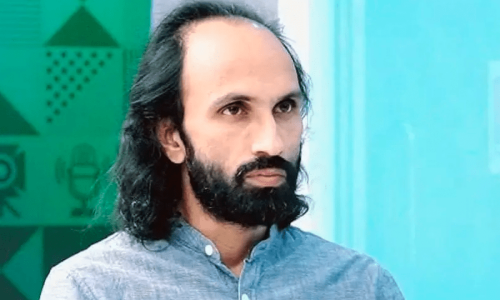
ISLAMABAD: The federal cabinet on Monday cleared the way for President Asif Ali Zardari to seek the opinion of the Supreme Court on review of the trial of in 1979, in which the founder of the PPP was given a death sentence.
Having held for long that his trial was unfair and a ‘judicial murder’, the party has for some time spoken about getting the decision reviewed; in fact, this has been a frequent topic of discussion among the party leadership during its current tenure. However, its latest move in this regard has taken some legal experts by surprise as the legality of the step about to be taken by the party is unclear.
Chances are that the president will approach the SC under Article 186 of the Constitution because a day earlier Law Minister Babar Awan had said that President Zardari would send a reference to the Supreme Court as “he enjoys powers under Article 186 of the Constitution”.
Article 186 reads: “(1) If, at any time, the president considers that it is desirable to obtain the opinion of the Supreme Court on any question of law which he considers of public importance, he may refer the question to the Supreme Court for consideration. (2) The Supreme Court shall consider a question so referred and report its opinion on the question to the president.”
However, legal experts are of the opinion that a simple review petition for the correction of the judgment should have been filed in the court instead of a presidential reference to the SC as the latter is limited to questions of law and not revision of past judgments.
Fakhruddin G. Ebrahim, a former SC judge, said: “I am not a criminal lawyer but I do believe that an international commission needs to be set up to revisit the case in light of the evidence provided by the government to clear Mr Bhutto of the charges on which he was hanged.”
He added that the hanging of Mr Bhutto was a judicial murder. “Till today, on paper Mr Bhutto is a murderer” and this needed to be rectified, he said.
However, it is noteworthy that Justice Ebrahim spoke of setting up an international commission, which is very different from the step the government is about to take.
Other legal experts are willing to go further. A former Balochistan high court judge Justice (retd) Tariq Mehmood said: “This reference is more political in nature and it may be difficult to prove it a fit case for article 186.” He further said: “Criminal cases have been reopened in the United States but never in Pakistan “.
He added that he feared the government intended to use this case to its advantage against the SC. In his opinion, if the PPP had been serious, it would have used its past two stints in power to move on this issue but it had not; and it was impossible to forget that its decision to do so now coincided with a tense phase of its relationship with the judiciary.
Chaudhry Naseer Ahmad, a Supreme Court lawyer, also felt that the reopening of the case would put unnecessary pressure on the judiciary and create more political turmoil.
“A reference after the lapse of 32 years of Bhutto’s hanging will only put the superior judiciary in a difficult position.
Chances are that the judges would reject it on technical grounds.”
Another lawyer pointed out that criminal cases could only be reopened if fresh evidence came to light. “This is not the situation in the Bhutto case,” he said.
Legal experts are not the only ones to have misgivings about PPP’s decision. Political observers also feel that the party is taking the step to gain some political mileage at a time when its government is facing pressure.
That some PPP leaders are also apprehensive is evident from the reports that not all cabinet members were in favour of this decision. Dawn has learnt that the cabinet was not unanimous in giving the go-ahead to the president in this regard.
A few ministers opposed the idea, arguing that it would reopen old wounds and aggravate the already tense relations between the judiciary and the government.
If the president goes ahead with the idea, despite the opposition from within and without, this will be the fourth presidential reference in the country’s history. The first was sent to the apex court by Pakistan’s governor general Ghulam Ahmed in 1955, the second reference was sent by president Ghulam Ishaq Khan in 1988 and the third by Gen (retd) Pervez Musharraf.
The first three, however, were made for interpretation of law while this one will be about a criminal case in which Mr Bhutto was convicted by the Lahore High Court. Later his review petition was rejected by the Supreme Court judges.











































